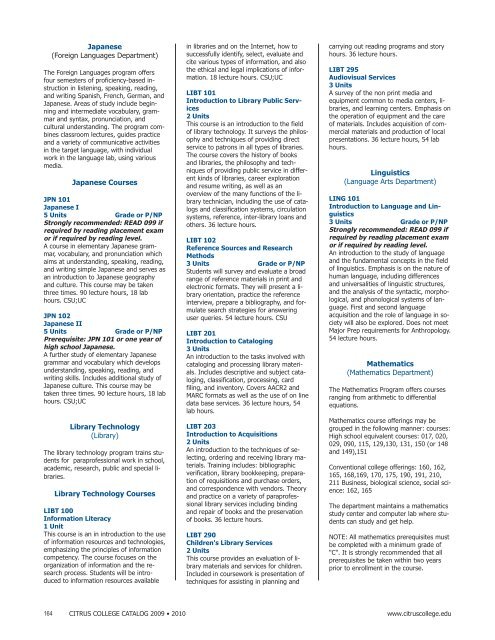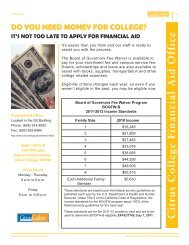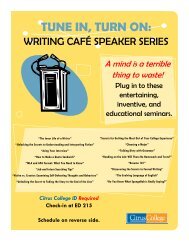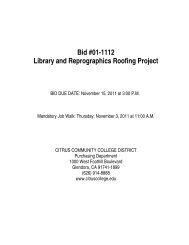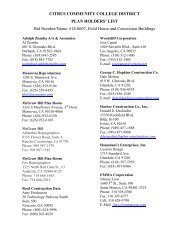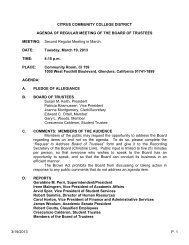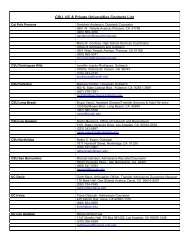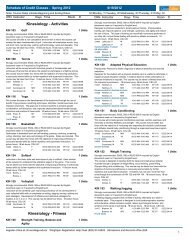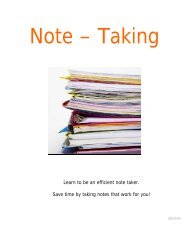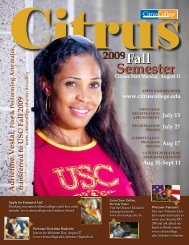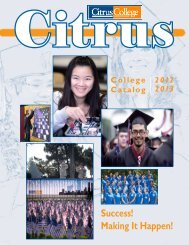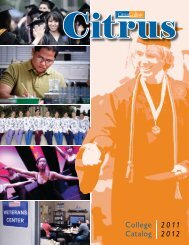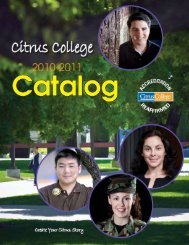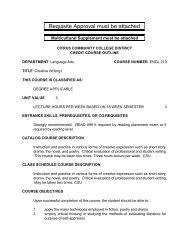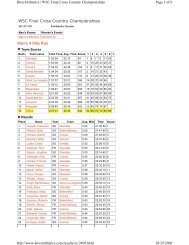Citrus College Catalog 2009-2010 (ver. 10/22
Citrus College Catalog 2009-2010 (ver. 10/22
Citrus College Catalog 2009-2010 (ver. 10/22
You also want an ePaper? Increase the reach of your titles
YUMPU automatically turns print PDFs into web optimized ePapers that Google loves.
164<br />
Japanese<br />
(Foreign Languages Department)<br />
The Foreign Languages program offers<br />
four semesters of proficiency-based instruction<br />
in listening, speaking, reading,<br />
and writing Spanish, French, German, and<br />
Japanese. Areas of study include beginning<br />
and intermediate vocabulary, grammar<br />
and syntax, pronunciation, and<br />
cultural understanding. The program combines<br />
classroom lectures, guides practice<br />
and a variety of communicative activities<br />
in the target language, with individual<br />
work in the language lab, using various<br />
media.<br />
Japanese Courses<br />
JPN <strong>10</strong>1<br />
Japanese I<br />
5 Units Grade or P/NP<br />
Strongly recommended: READ 099 if<br />
required by reading placement exam<br />
or if required by reading level.<br />
A course in elementary Japanese grammar,<br />
vocabulary, and pronunciation which<br />
aims at understanding, speaking, reading,<br />
and writing simple Japanese and serves as<br />
an introduction to Japanese geography<br />
and culture. This course may be taken<br />
three times. 90 lecture hours, 18 lab<br />
hours. CSU;UC<br />
JPN <strong>10</strong>2<br />
Japanese II<br />
5 Units Grade or P/NP<br />
Prerequisite: JPN <strong>10</strong>1 or one year of<br />
high school Japanese.<br />
A further study of elementary Japanese<br />
grammar and vocabulary which develops<br />
understanding, speaking, reading, and<br />
writing skills. Includes additional study of<br />
Japanese culture. This course may be<br />
taken three times. 90 lecture hours, 18 lab<br />
hours. CSU;UC<br />
Library Technology<br />
(Library)<br />
The library technology program trains students<br />
for paraprofessional work in school,<br />
academic, research, public and special libraries.<br />
Library Technology Courses<br />
LIBT <strong>10</strong>0<br />
Information Literacy<br />
1 Unit<br />
This course is an in introduction to the use<br />
of information resources and technologies,<br />
emphasizing the principles of information<br />
competency. The course focuses on the<br />
organization of information and the research<br />
process. Students will be introduced<br />
to information resources available<br />
in libraries and on the Internet, how to<br />
successfully identify, select, evaluate and<br />
cite various types of information, and also<br />
the ethical and legal implications of information.<br />
18 lecture hours. CSU;UC<br />
LIBT <strong>10</strong>1<br />
Introduction to Library Public Services<br />
2 Units<br />
This course is an introduction to the field<br />
of library technology. It surveys the philosophy<br />
and techniques of providing direct<br />
service to patrons in all types of libraries.<br />
The course co<strong>ver</strong>s the history of books<br />
and libraries, the philosophy and techniques<br />
of providing public service in different<br />
kinds of libraries, career exploration<br />
and resume writing, as well as an<br />
o<strong>ver</strong>view of the many functions of the library<br />
technician, including the use of catalogs<br />
and classification systems, circulation<br />
systems, reference, inter-library loans and<br />
others. 36 lecture hours.<br />
LIBT <strong>10</strong>2<br />
Reference Sources and Research<br />
Methods<br />
3 Units Grade or P/NP<br />
Students will survey and evaluate a broad<br />
range of reference materials in print and<br />
electronic formats. They will present a library<br />
orientation, practice the reference<br />
interview, prepare a bibliography, and formulate<br />
search strategies for answering<br />
user queries. 54 lecture hours. CSU<br />
LIBT 201<br />
Introduction to <strong>Catalog</strong>ing<br />
3 Units<br />
An introduction to the tasks involved with<br />
cataloging and processing library materials.<br />
Includes descriptive and subject cataloging,<br />
classification, processing, card<br />
filing, and inventory. Co<strong>ver</strong>s AACR2 and<br />
MARC formats as well as the use of on line<br />
data base services. 36 lecture hours, 54<br />
lab hours.<br />
LIBT 203<br />
Introduction to Acquisitions<br />
2 Units<br />
An introduction to the techniques of selecting,<br />
ordering and receiving library materials.<br />
Training includes: bibliographic<br />
<strong>ver</strong>ification, library bookkeeping, preparation<br />
of requisitions and purchase orders,<br />
and correspondence with vendors. Theory<br />
and practice on a variety of paraprofessional<br />
library services including binding<br />
and repair of books and the preservation<br />
of books. 36 lecture hours.<br />
LIBT 290<br />
Children's Library Services<br />
2 Units<br />
This course provides an evaluation of library<br />
materials and services for children.<br />
Included in coursework is presentation of<br />
techniques for assisting in planning and<br />
carrying out reading programs and story<br />
hours. 36 lecture hours.<br />
LIBT 295<br />
Audiovisual Services<br />
3 Units<br />
A survey of the non print media and<br />
equipment common to media centers, libraries,<br />
and learning centers. Emphasis on<br />
the operation of equipment and the care<br />
of materials. Includes acquisition of commercial<br />
materials and production of local<br />
presentations. 36 lecture hours, 54 lab<br />
hours.<br />
Linguistics<br />
(Language Arts Department)<br />
LING <strong>10</strong>1<br />
Introduction to Language and Linguistics<br />
3 Units Grade or P/NP<br />
Strongly recommended: READ 099 if<br />
required by reading placement exam<br />
or if required by reading level.<br />
An introduction to the study of language<br />
and the fundamental concepts in the field<br />
of linguistics. Emphasis is on the nature of<br />
human language, including differences<br />
and uni<strong>ver</strong>salities of linguistic structures,<br />
and the analysis of the syntactic, morphological,<br />
and phonological systems of language.<br />
First and second language<br />
acquisition and the role of language in society<br />
will also be explored. Does not meet<br />
Major Prep requirements for Anthropology.<br />
54 lecture hours.<br />
Mathematics<br />
(Mathematics Department)<br />
The Mathematics Program offers courses<br />
ranging from arithmetic to differential<br />
equations.<br />
Mathematics course offerings may be<br />
grouped in the following manner: courses:<br />
High school equivalent courses: 017, 020,<br />
029, 090, 115, 129,130, 131, 150 (or 148<br />
and 149),151<br />
Conventional college offerings: 160, 162,<br />
165, 168,169, 170, 175, 190, 191, 2<strong>10</strong>,<br />
211 Business, biological science, social science:<br />
162, 165<br />
The department maintains a mathematics<br />
study center and computer lab where students<br />
can study and get help.<br />
NOTE: All mathematics prerequisites must<br />
be completed with a minimum grade of<br />
"C". It is strongly recommended that all<br />
prerequisites be taken within two years<br />
prior to enrollment in the course.<br />
CITRUS COLLEGE CATALOG <strong>2009</strong> • <strong>20<strong>10</strong></strong> www.citruscollege.edu


